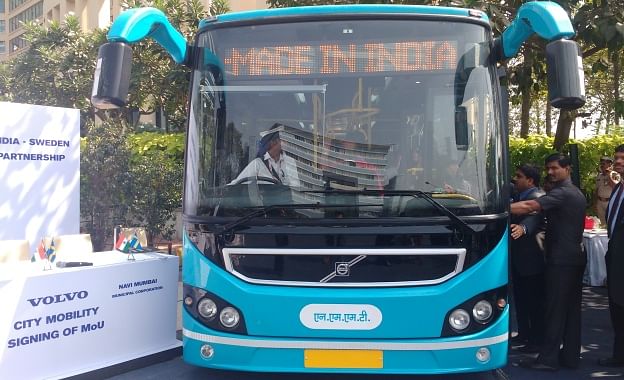Volvo delivers first hybrid buses in India, to ply on Navi Mumbai roads
The Volvo 8400 City buses, which are certified by the ARAI, fall under the government’s FAME scheme.
Volvo Buses India today delivered the first hybrid buses in India. Navi Mumbai became the first city in India to adopt hybrid buses. The announcement was made on the sidelines of the Make in India week in Mumbai. The Prime Minister of Sweden Stefan Lofven handed over a symbolic key of the bus to the Chief Minister of Maharashtra, Devendra Fadnavis in the presence of Volvo Buses' Akash Passey, senior vice president – Business region International and VRV Sriprasad, business head for India & South Asia.
The Volvo 8400 City buses, which are certified by the Automotive Research Association of India (ARAI), fall under the government’s Faster Adoption & Manufacturing of Electric and hybrid vehicle (FAME) scheme and will thus receive around Rs 61 lakh as subsidy, taking the total cost of the bus to Rs 2.3 crore. The hybrid buses are a variant of the existing 8400 series bus, 1500 units of which are currently plying in 34 cities across India.
Autocar Professional first broke the news of Volvo developing hybrid buses in October last year. In December, we reported the Swedish company’s pilot project to tie up with Navi Mumbai Municipal Transport (NMMT). Consequently, Volvo Buses signed an MoU with NMMT making Navi Mumbai the first city in India to use hybrid buses. Navi Mumbai will be later followed by Thane to ply Volvo’s hybrid buses.
Commenting on the occasion, Akash Passey said, “This is a significant development that the first hybrid bus being introduced in India is a Volvo. Our first electromobility journey in India started with an investment back in 2007. From developing BRT solutions to cleaner technologies, we have always taken the first initiative. The hybrid solution has a proven track record of saving 30 to 35 percent fuel. The technology also enables up to 50 percent reduction in hazardous emissions in actual customer operations. We are confident that this initiative will spur demand from other cities in India for hybrid mobility solutions.”
Also commenting on the occasion was VRV Sriprasad, “This is yet another high point in Volvo Buses’ India journey that spans over 14 years. We are already partnering five cities worldwide and now Navi Mumbai and Thane also get added as our partnership cities. I would like to thank Navi Mumbai Municipal Corporation for the confidence and trust imposed on Volvo. Their initiative to take the first step to operate Volvo hybrid buses is admirable. We are also actively engaging in this self-sustainable mobility mission. Going forward, we look to strengthen our electromobility programme in India.”
Working of the Volvo 8400 Hybrid city bus

The new Volvo 8400 Hybrid city bus has a parallel hybrid system, which comprises a 5-litre, 4-cylinder, in-line diesel engine and an electric motor, which generates 160 hp of power. The vehicle, which starts via diesel, is propelled on electric mode till it gains momentum. It will run on electric mode until a speed of 20 kph, after which it switches to diesel mode. The phenomenon happens at every stop & start during the operation cycle, which results in significant fuel savings and reduction of emissions. The batteries get charged during operations by the re-generative brake system, thus making the buses ideal for city traffic.
“The Lithium ion-powered battery charge has to be normalized or balanced for every ride. The energy from regenerative brake system is utilized again in the bus, similar to a dynamo, powering air-condition and the automatic doors of the bus,” explained Arun Uchila, product manager, Volvo Buses India.
One of the biggest benefits of the hybrid technology is the reduction in noise levels, both inside and outside the bus. The vehicle also has the Volvo I-Coaching, a one-of-its-kind on-board driver training system that ensures the best performance from hybrid systems. The company is looking to train drivers especially for the hybrid buses. The telematics system with fleet and vehicles management capabilities monitors and generates fuel reports, vehicle health reports, battery usage and health monitoring finance.
The bus meets the Bus Body Code and Urban Bus specification norms. It is equipped with safety features including two fire extinguishers, hammers, internal stop request and emergency stop request switches, external electric and pneumatic door operating switches and fire suppression system in the engine hatch area.
RELATED ARTICLES
Cosmo First diversifies into paint protection film and ceramic coatings
The Aurangabad, Maharashtra-based packaging materials supplier is leveraging its competencies in plastic films and speci...
JSW MG Motor India confident of selling 1,000 M9 electric MPVs in first year
The 5.2-metre-long, seven-seater luxury electric MPV, which will be locally assembled at the Halol plant in Gujarat, wil...
Modern Automotives targets 25% CAGR in forged components by FY2031, diversifies into e-3Ws
The Tier-1 component supplier of forged components such as connecting rods, crankshafts, tie-rods, and fork bridges to l...






 By Takshak Dawda
By Takshak Dawda
 14 Feb 2016
14 Feb 2016
 13397 Views
13397 Views


















 Autocar Professional Bureau
Autocar Professional Bureau




